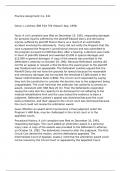Cas
Darcy v. Lolohea Case Brief
- Cours
- Établissement
This is a case brief on Darcy v. Lolohea, 886 P.2d 756 (Hawai’i App. 1994), and is written in IRAC format for the course, Alternative Dispute Resolution. The issue is "Whether an award which has become a final judgment under the Program’s HAR Rule, may be challenged in the circuit court or in t...
[Montrer plus]



